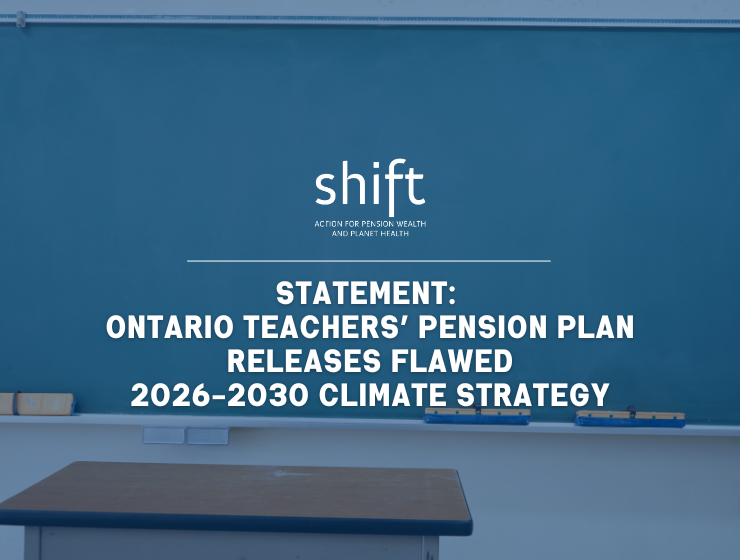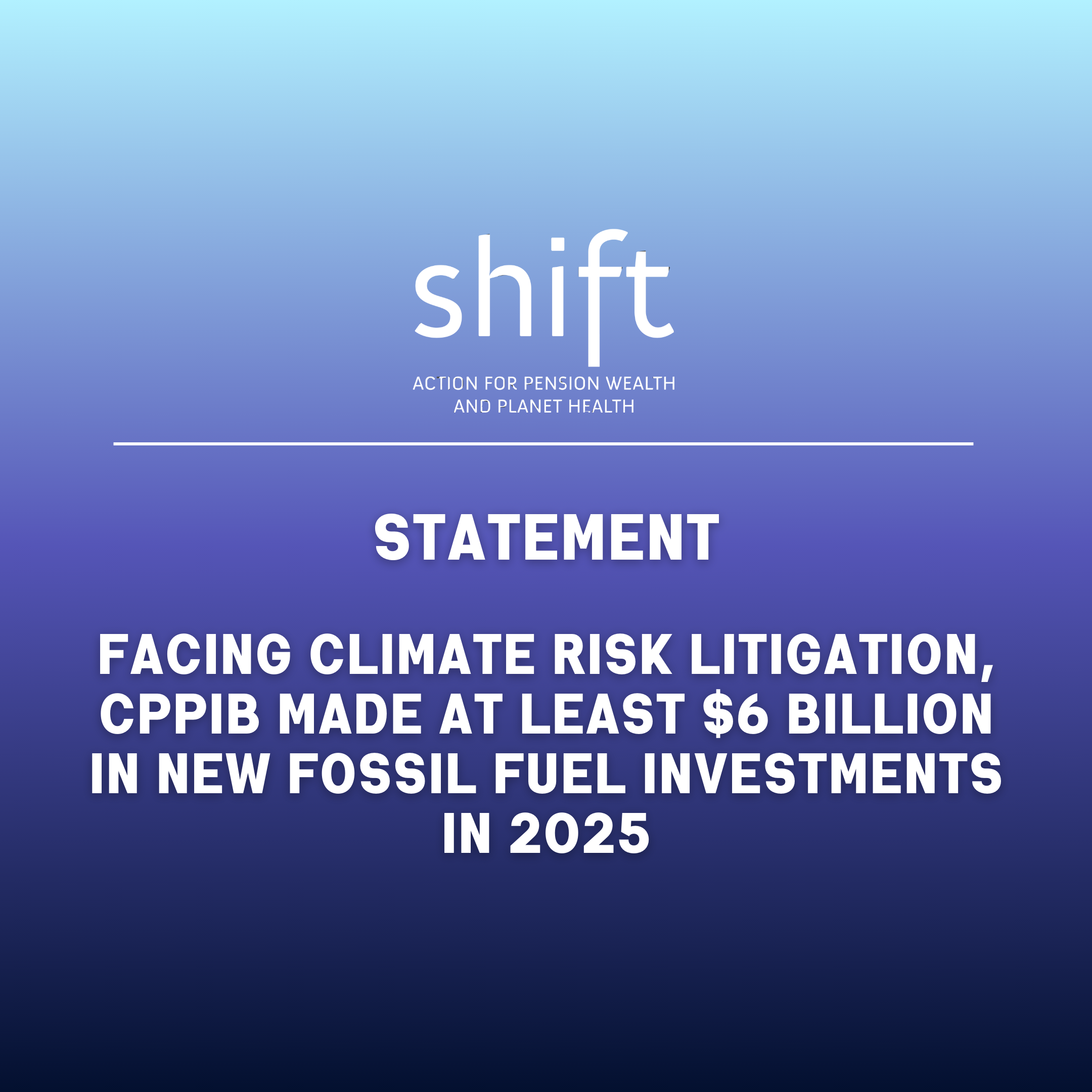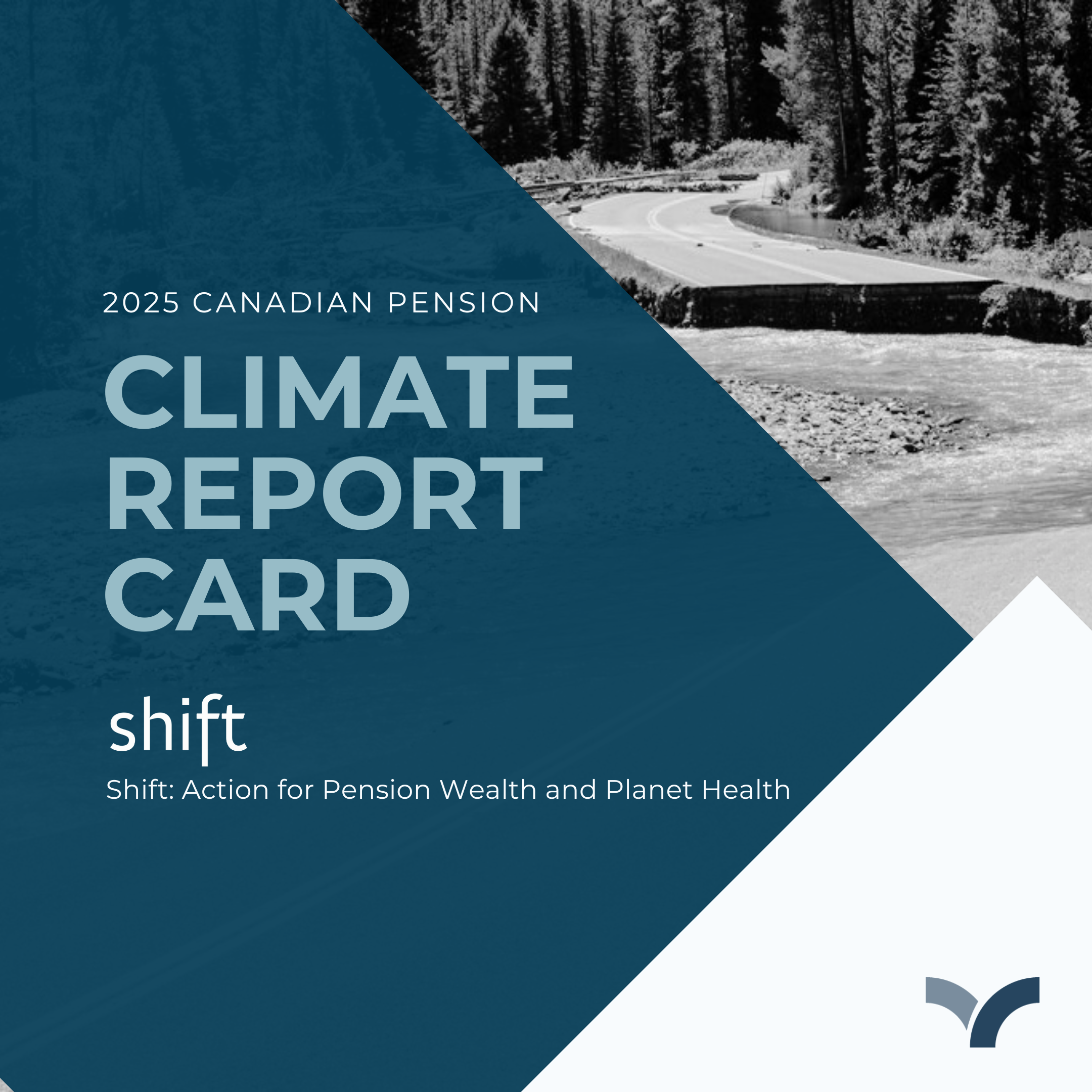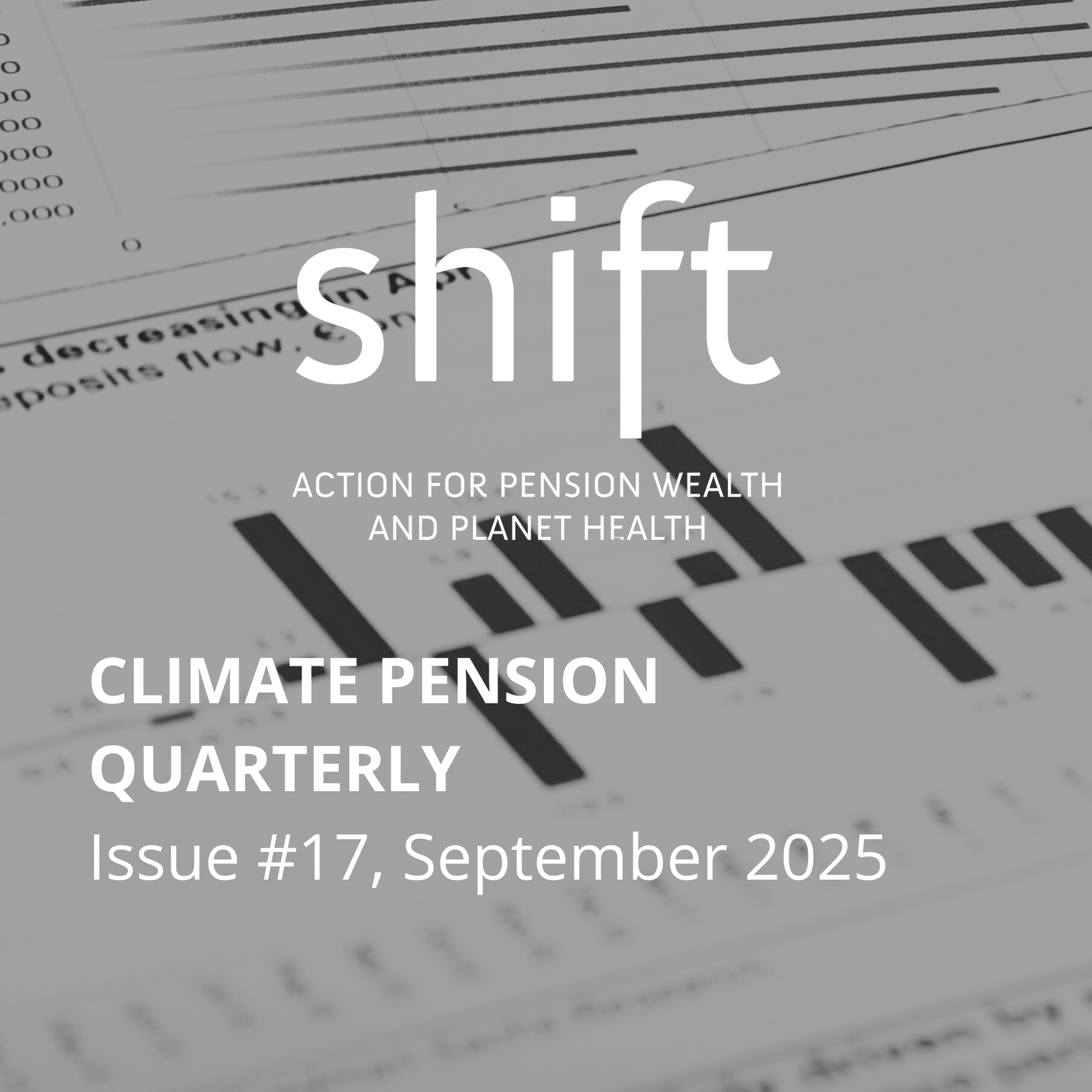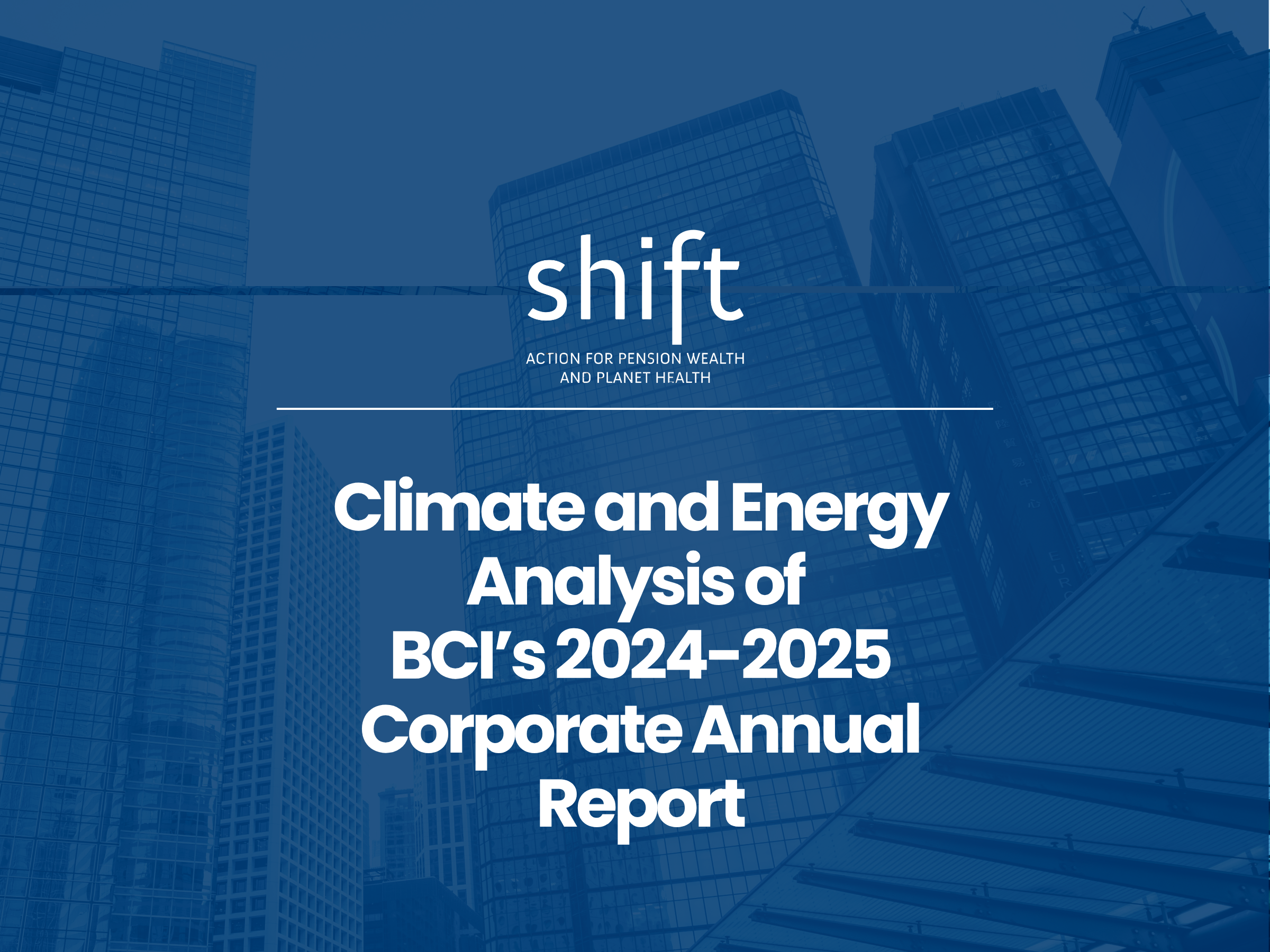Statement on Ontario Teachers’ flawed 2026-2030 climate strategy
OTPP’s Climate Transition Aligned Framework: 2026-2030 Climate Strategy has the fund moving in a smart and strategic direction to focus on real-world decarbonization. But OTPP’s strategy has major blind spots which, if not corrected quickly, could lead to serious consequences for the financial sustainability of the OTPP portfolio and the climate that Ontario teachers retire into.
Statement: Facing climate risk litigation, CPPIB made at least $6 billion in new fossil fuel investments in 2025
Facing landmark climate risk litigation, the Canada Pension Plan Investment Board (CPP Investments, or CPPIB) made at least $6 billion* in new bets on fossil fuel assets in the 2025 calendar year. This includes nearly $2 billion** in fossil fuel investments reported in CPPIB’s Third Quarter Fiscal 2026 results, announced today and covering the period of October 1 to December 31, 2025.
REPORT: Widening Divide in Canadian Pension Climate Leadership as CPPIB faces lawsuit
Today, Shift released its annual Canadian Pension Climate Report Card, an independent benchmark for evaluating the quality, depth and credibility of climate policies for 11 of Canada’s largest pension managers.
This fourth edition reveals a stark and widening divide across Canada’s pension sector. While climate leaders are advancing ambitious strategies, scaling up climate investments and embedding climate risk into portfolio decisions, backsliders are going quiet on climate, retreating from commitments and expanding fossil fuel exposure.
Climate Pension Quarterly - Issue #18
In this Climate Pension Quarterly, we examine the global momentum of the energy transition and the forces driving it. Political noise and oil and gas industry talking points cannot change the fact that pension funds need a stable climate in order to protect their long-term returns and meet their obligations to beneficiaries. When policymakers and other investors waver on their climate commitments, it becomes even more important for pension funds to hold the line.
CPPIB Watch: A quarterly update on CPPIB-owned fossil fuel companies (October – December 2025)
In late October, four young Canadians announced they are taking the Canada Pension Plan Investment Board (CPPIB) to court. The young Canada Pension Plan (CPP) members claim that CPPIB is breaching its duty to invest in their best interests and subjecting their pensions to undue risk of loss by failing to adequately manage climate risks. CPPIB’s quarterly financial report, announced a few weeks later, appears to underscore concerns raised in the young Canadians’ legal challenge. The report showed four new private investments in fossil fuels between July and October 2025, and an estimated total of $7.1 billion in new fossil fuel investments in the previous year.
Statement: Canada’s Chief Actuary continues to severely underestimate climate risks to the CPP
In its 32nd Actuarial Report on the Canada Pension Plan (CPP), published on Monday, Canada’s Office of the Chief Actuary (OCA) has again failed to consider the increasing potential for systemic climate-related financial risks in its “baseline” assessment of the sustainability of the CPP. The harsh reality is that the future health of programs like the CPP is dependent on a stable climate. A precautionary warning from actuaries is needed to make this clear for decision-makers.
Statement: Facing climate litigation, CPPIB made at least $7.1 billion in new fossil fuel investments in the last year
Facing landmark climate litigation, the Canada Pension Plan Investment Board (CPP Investments, or CPPIB) has committed at least $7.1 billion to new oil, gas, coal and pipeline assets in the last year. CPPIB’s quarterly financial report shows Canada’s national pension manager committing an estimated additional $6 billion to fossil fuels in just its second quarter of fiscal 2026, plus October. Every dollar CPPIB invests in fossil fuels is a long-term bet against a Paris-aligned energy transition – worsening the climate crisis and putting Canadians’ retirement security at greater risk.
Statement: Climate Finance Experts React to the 2025 Budget
While this budget aspires to advance climate competitiveness, it leaves Canada’s financial system dangerously underprepared for the climate crisis. Future-proofing the Canadian economy from the worsening economic, societal, and physical harms from climate risks, while capturing economic opportunities, requires serious policies to align Canada’s financial system with climate goals. Instead, Prime Minister Carney’s government appears to backtrack on the basics.
Canada’s largest pension investment manager sued over alleged climate risk mismanagement
Four young people in Canada are taking the sixth largest pension fund manager in the world to court, claiming it is breaching its duty to invest in their best interests by failing to protect their pensions from climate risk. Represented by lawyers from Ecojustice and Goldblatt Partners LLP, Aliya Hirji, Travis Olson, Rav Singh, and Chloe Tse, allege that the Canada Pension Plan Investment Board (CPPIB) is breaching its legal duties by subjecting pension contributions to undue risk of loss from poorly managed climate risk.
Climate and energy analysis of BCI’s 2024-2025 Stewardship Report
On September 16, BCI published its 2024-2025 Stewardship Report, reaffirming its commitment to climate stewardship at a time when some institutional investors are scaling back ESG priorities amid political and market headwinds. Unlike peers that have softened their climate positions, BCI has remained vocal about the financial materiality of climate risk and the importance of robust policy frameworks to support the global transition. Despite its ongoing engagement and stewardship efforts, BCI’s approach is insufficient to drive change at the pace required by the climate crisis.
Statement: CPPIB bets another $1.4 billion on fossil fuel power plants
The Canada Pension Plan Investment Board (CPPIB) today announced a new $1.4 billion investment to take a minority stake in a major American fossil fuel power plant operator– yet another gamble on climate failure that imperils the Canada Pension Plan and its members. The investment in AlphaGen, which owns and operates 23 power plants that burn fossil gas, oil, diesel and kerosene across six states, means CPPIB has now gambled $5.5 billion on risky new fossil fuel investments within the last two weeks– following its $4.1 billion investment in Sempra Infrastructure on September 23.
Statement: CPPIB Gambles Over $4 Billion on Climate Failure
The Canada Pension Plan Investment Board (CPPIB) today announced a new $4.1 billion investment in fossil gas, barely a day after its chief sustainability officer admitted in The Globe and Mail that investors are struggling to manage worsening climate-related financial risks, with physical risks "happening earlier than expected, with greater impact than was anticipated.”
Climate Pension Quarterly - Issue #17
In this Climate Pension Quarterly, we examine growing political pressure on pension funds to back fossil fuel expansion, highlight new legal and scientific developments raising the financial stakes, track recent moves by Canadian pension funds in and out of oil and gas, and spotlight our ongoing scrutiny of CPPIB’s fossil fuel investments and influence.
CPPIB Watch: A quarterly update on CPPIB-owned fossil fuel companies (July – September 2025)
Amidst another summer of heatwaves, droughts and wildfires forcing Canadians to flee their homes, the Canada Pension Plan Investment Board (CPPIB) continues to own and invest in companies that are prolonging the use of fossil fuels and making the climate crisis worse. In some cases, CPPIB is directly financing the expansion of oil and gas infrastructure, causing more carbon pollution to be pumped into the atmosphere and betting the world will fail to limit global warming to safe levels.
Feds must consider oil and gas conflicts for Canada Pension Plan appointees
In an op-ed published in The Hill Times, Shift’s Campaign Specialist Cheryl Randall and Senior Manager Laura McGrath write that as the federal cabinet prepares to soon appoint new Canada Pension Plan Investment Board (CPPIB) directors, it must prioritize candidates with proven climate expertise and no fossil fuel ties to restore credibility and protect the long-term security of Canadians’ pensions.
Shift warns Canada's Chief Actuary is severely underestimating climate risks to public pension plans
Shift, represented by environmental law charity Ecojustice, has written to Canada's Office of the Chief Actuary (OCA) warning that the OCA is severely underestimating the systemic financial risks of climate change in its valuation assessments. Shift and Ecojustice are concerned that the OCA is failing to assess the cascading economic and financial impacts of a rapidly warming world. This could have potentially severe consequences for the Canada Pension Plan (CPP) and the Public Sector Pension Plan (PSPP), which collectively have more than $1 trillion in retirement savings under management on behalf of millions of Canadians.
As climate-fueled wildfires rage, CPPIB praises Canada’s largest oil & gas producer
Amidst another summer of heatwaves, droughts and wildfires forcing Canadians to flee their homes, the Canada Pension Plan Investment Board (CPPIB) made a bizarre decision to profile its investment in an oil and gas company whose business model is fundamentally incompatible with the long-term retirement security of Canadians.
The SBTi’s Financial Institutions Net-Zero Standard– and what it means for Canada’s pension funds
The Science-Based Targets initiative (SBTi), which is already being utilized by many of Canada’s largest pension funds, has clearly spelled out that net-zero alignment requires pension funds to end project financing for any fossil fuel expansion immediately, and cut off financing of any company involved in fossil fuel expansion by 2030 at the latest. Will Canadian pension funds apply the new SBTi Financial Institute Net-Zero Standard to themselves?
Climate and Energy Analysis of BCI’s 2024-2025 Annual Report
BC is experiencing the devastating impacts of climate change in real time, including unprecedented wildfires, devastating heat domes, and flooding that has caused billions in damages. Climate impacts are not some distant threat for BC, but a current reality. Yet BCI continues to lag behind other Canadian and international pension funds on its approach to the climate crisis. Read Shift’s climate and energy analysis of BCI’s 2024-2025 Annual Report.
Canadian pensions vote against shareholder proposal seeking clarity in Brookfield’s definition of “transition” assets
At Brookfield’s AGM in June, nearly all of Canada’s largest pension funds voted against Shift’s shareholder proposal asking the company to disclose specific criteria for inclusion of assets within its transition-labeled funds. Only Ontario’s University Pension Plan (UPP) voted for our proposal.

